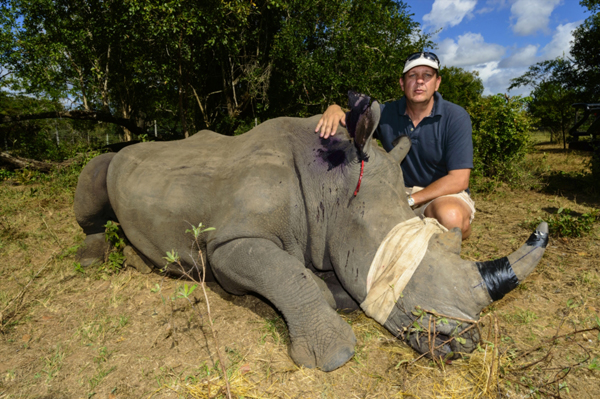A private safari company has moved six white rhinos (Ceratotherium simum) from their home in South Africa to Botswana in a bid to save them from an out-of-control poaching crisis in their native land. Currently, around two rhinos are killed everyday in South Africa for their horns, which are then smuggled to East Asia.
This month &Beyond translocated six rhinos from their Phinda Private Game Reserve in South Africa to Botswana’s Okavango Delta. The move was made shortly after the company helped arrest a number of poachers near the reserve. &Beyond says in a press release that the rhinos will receive better protection in Botswana.
“Botswana has a strong security and monitoring framework in place whereby the Department of Wildlife Anti-Poaching Unit and the Botswana Defence Force help to protect the species,” the tour company writes.
On arrival in Botswana, the team confirmed some good news: one of the females was pregnant. Given on-going security concerns the rhinos will also be monitored 24/7.
“All six rhino have been collared and microchipped for research and monitoring purposes and they will be tracked daily by our research team. The information gathered will help guide and secure future translocations,” the company notes. “Guests visiting our lodges in the Okavango Delta will also be able to enjoy guided nature walks with our expert guides to view these endangered animals in their new home.”
In the last 18 months, Africa has lost over 1,000 rhinos to poachers. Rhino horns are sought by consumers in East Asia, who view them as a curative despite scientific evidence to the contrary. Increasing demand in places like Vietnam has pushed illegal rhino horn powder prices past gold.
White rhinos are the world’s most populous, which also makes them the easiest target for poachers. Listed as Vulnerable by the IUCN Red List, around 20,000 white rhinos survive in the wild. The species made an incredible comeback after falling to around just 20-50 animals in the early Twentieth Century due to relentless hunting. Over 90 percent of the world’s white rhinos are found in South Africa.
To see a photo essay of the translocation: To Catch a Rhino: Saving a Species

Moving a white rhino from Phinda Private Game Reserve. Photo by: Roger de la Harpe/&Beyond.

Working with sedated rhino. Photo by: Roger de la Harpe/&Beyond.

Translocating one of six rhinos. Photo by: Roger de la Harpe/&Beyond.
Related articles
Prince Charles: take the war to the poachers
(05/22/2013) Prince Charles has warned that criminal gangs are turning to animal poaching, an unprecedented slaughter of species that can only be stopped by waging war on the perpetrators, in the latest of a series of increasingly outspoken speeches about the environment. Addressing a conference of conservationists at St James’s Palace in London, the Prince of Wales announced a meeting of heads of state to take place this autumn in London under government auspices to combat what he described as an emerging, militarized crisis.
Rhinos now extinct in Mozambique’s Limpopo National Park
(04/25/2013) Poachers have likely killed off the last rhinos in Mozambique’s Limpopo National Park, according to a park official.
Rhino horn madness: over two rhinos killed a day in South Africa
(04/22/2013) Rhino poachers have killed 232 rhinos during 2013 so far in South Africa, reports Annamiticus, which averages out to 2.1 a day. The country has become a flashpoint for rhino poaching as it holds more rhinos than any other country on Earth. Rhinos are being slaughter for their horns, which are believed to be a curative in Chinese traditional medicine, although there is no evidence this is so.
South African reserve poisons rhinos’ horns to deter poaching
(04/11/2013) A game reserve in South Africa has taken the radical step of poisoning rhino horns so that people risk becoming ‘seriously ill’ if they consume them.
Poachers enlisting impoverished wildlife rangers as accomplices in elephant, rhino killing
(04/01/2013) Corruption among wildlife rangers is becoming a serious impediment in the fight against poaching, fuelled by soaring levels of cash offered by criminal poacher syndicates, senior conservation chiefs have admitted. Rangers in countries as diverse as Tanzania and Cambodia are being bribed by increasingly organised poaching gangs keen to supply ivory, rhino horn and tiger parts to meet huge consumer demand in Asia.
Rhino wars: documenting the poaching crisis in South Africa

(01/16/2013) In 2012 a record 668 rhinos were slaughtered by poachers in South Africa for the horns, which are used as scientifically-debunked medicine in Asia. Rhino poaching has hit record levels worldwide over the past few years, but no where is the carnage greater than South Africa, which houses well over half of the world’s rhinos. Thus it’s no surprise that when student filmmaker, Anne Goodard, arrived in South Africa to film zebra behavior, she quickly became enthralled by the dark and tragic drama surrounding the country’s rhinos.
How a text message could save an elephant or a rhino from a poacher
(01/15/2013) Soon a text message may save an elephant’s or rhino’s life. The Kenya Wildlife Service (KWS) is implementing a new alarm system in some protected areas that will alert rangers of intruders via a text message, reports the Guardian. Elephants and rhinos have been killed in record numbers across Africa as demand for illegal rhino horns and ivory in Asia has skyrocketed.
Rhino poaching hits new record in 2012
(01/11/2013) 668 rhinos were killed in South Africa during 2012 according to new figures released by the South African government. The total, which represents a 49 percent rise over the 448 killed in 2011, reveals the heavy toll the black market trade in rhino horn is taking on one of Africa’s best known and most endangered animals.














